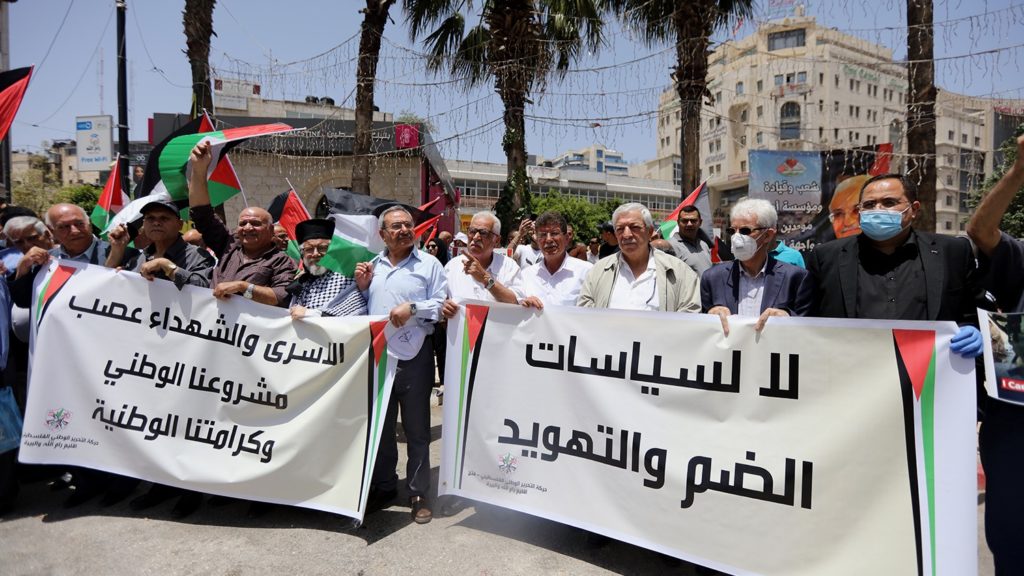Australia/Israel Review
The apathy of the Palestinian street
Jul 1, 2020 | Khaled Abu Toameh

On June 20, the Palestinian Authority (PA) and the ruling Fatah faction repeated their call to Palestinians to stage mass protests against Israeli intentions to apply its sovereignty to parts of the West Bank.
The PA and Fatah are hoping that the widespread protests will start in various parts of the West Bank.
So far, however, the Palestinians have failed to heed the call for taking to the streets en masse to demonstrate against the Israeli “annexation” plan, much to the dismay of senior PA and Fatah officials.
Palestinian political analysts said that the apathy could be attributed to a number of factors.
First, the outbreak of the coronavirus pandemic and its impact on the Palestinian economy has taken attention away from political and security issues, particularly those related to Israel. Many Palestinians seem to be more worried about the growing number of coronavirus infections and the poor economy than the annexation plan.
Second, many Palestinians remain sceptical about the PA leadership’s motives and intentions, particularly regarding PA President Mahmoud Abbas’ May 18 decision to renounce all agreements and understandings with Israel, including halting security coordination between the Palestinian security forces and the IDF.
These Palestinians do not take Abbas’ recurring threats to walk away from agreements signed with Israel seriously. They see his announcement as a mere tactical step aimed at pressuring Israel into abandoning its annexation plan and placating the Palestinian public.
Third, many Palestinians seem to have lost confidence in the Palestinian leadership’s ability to confront Israeli and US Administration policies and decisions. As far as these Palestinians are concerned, the PA leadership has failed in preventing Israel from pursuing its policies and measures in the West Bank and east Jerusalem, including settlement construction.
In addition, in the past three years the PA leadership has failed in stopping the US Administration from recognising Jerusalem as Israel’s capital, relocating the US Embassy from Tel Aviv to Jerusalem, closing the PLO office in Washington DC and halting US financial aid to the United Nations Relief and Works Agency for Palestine Refugees (UNRWA).
Fourth, Palestinians do not feel that most Arab states now fully support them in their conflict with Israel and the US Administration. In fact, Palestinians have seen that some Arab states are on board with US President Donald Trump’s Administration, especially the US “Peace to Prosperity” plan.
Moreover, the Palestinians see how some Arab countries, while paying them lip service, are continuing to engage in the normalisation of their relations with Israel.
Fifth, the ongoing power struggle between Fatah and Hamas, which recently entered its 13th year, has further convinced Palestinians that their leaders are acting on the basis of personal, not national, interests. A common argument made by Palestinians is that the split between the West Bank and Gaza Strip “plays into the hands of Israel” and “poses an existential threat to the Palestinian national project.”
Under the current circumstances, Palestinians feel less motivated to take to the streets to protest Israeli or US policies as Fatah and Hamas leaders continue to engage in an incomprehensible struggle over money and power.
Sixth, apparently some Palestinians are afraid of being targeted by the PA security forces if and when they engage in violent attacks against the IDF and settlers in the West Bank. Despite Abbas’ decision to suspend security coordination with Israel, the PA security forces continue to arrest and interrogate Palestinian activists, especially those affiliated with Hamas and other extremist groups in the West Bank.
“The Palestinian Authority leadership is very weak,” said Ghazi Hamad, a senior Hamas official in the Gaza Strip. “The correct approach for addressing the state of regression, failure and helplessness among Palestinians is by finding a new national leadership that is honest and has a strategic vision. The weakness of the Palestinian leadership and its failure to take serious measures in response to dangerous moves, such as settlement expansion and land confiscation, have encouraged Israel and the US administration to undervalue our people. This shameful weakness has killed the national spirit of our people in the West Bank and prevented any serious movement to confront Israel.”
Palestinian political analyst Marwan Ezzadin said he does not believe that Palestinians are prepared for another Intifada against Israel. “The Palestinian Authority and Fatah are making a big effort to send thousands of people to the streets to protest the annexation plan,” Ezzadin noted. “We may see large demonstrations in the coming days, but neither the Palestinian Authority nor Fatah want an all-out confrontation with Israel. They know that a new Intifada would have catastrophic consequences for the Palestinians.”
On June 19, Abbas chaired another meeting of the Fatah Central Committee in Ramallah to discuss ways of curbing the spread of the coronavirus in the West Bank and thwarting Israel’s annexation plan.
“Our people won’t accept the annexation of one centimetre of their land,” the committee said in a statement after the meeting. It also called on Palestinians to “continue popular activities, on all levels and in all areas, to confront the Israeli annexation plan.”
A Fatah official who attended the meeting said some of his colleagues expressed concern over the “apathy of the Palestinian public” to repeated calls for holding mass demonstrations against the Israeli plan.
“There’s a gap between the leadership and the people,” the official said. “We need to make a bigger effort to organise popular activities in the West Bank. We also need to find ways to restore our people’s confidence in their leadership.”
Khaled Abu Toameh is an award-winning Palestinian Affairs journalist based in Jerusalem. Reprinted from the Jerusalem Post. © Jerusalem Post, (www.jpost.com), reprinted by permission, all rights reserved.
Tags: Fatah, Israel, Palestinians






